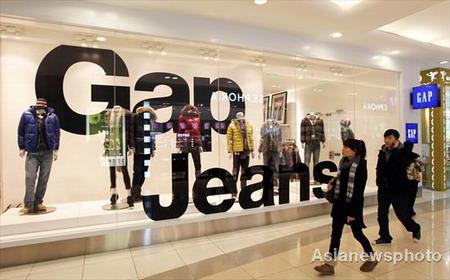
Customers walk past the GAP store in Beijing APM, Dec 5, 2010. [Photo / Asianewsphoto]
Apparel retailer uses online presence to promote its wares, servicesBEIJING - It's a common scene in Gap Inc stores for shoppers to point at pictures they are carrying and tell assistants: "I want this".
These customers will have visited the shop's website, decided what they like and printed off the pictures before moving from the virtual domain to the real one.
Shopping at Gap could not be more convenient because the US' largest specialty clothes retailer not only sells its products on its website, but also offers a free delivery service.
Furthermore, the website provides dressing tips and hosts interactive programs to attract consumers.
According to Glenn Murphy, chief executive officer of Gap, having an online store is vital in the e-commerce era.
The fashion brand has now introduced its online strategy to the world's fastest-growing economy, with a Chinese-version website and online store, gap.cn, launched in China last month.
The virtual shop is a joint venture with a Shanghai-based information technology company looking after order management and Gap controlling the e-commerce and storage side.
So far, Gap China's online store has received orders from places as far apart as Harbin in Northeast China, Kunming in Southwest China, Xinjiang in Northwest China and Guangdong in South China.
Gap initiated its online business in 1997 in developed markets. It cooperated with the global deal-of-the-day website Groupon.com in August to have discount activities in 85 cities in North America and created sales of $11 million, Global Entrepreneur magazine reported.
Early in November, social website Facebook.com developed a platform for retailers to provide potential consumers with discount products. Gap immediately launched a marketing initiative by sending free jeans to the first 10,000 netizens who joined and attracted lots of customers to its stores.
Compared with its global competitors such as Zara and H&M, Gap is a late-comer. But Murphy said, "We are not in a hurry."
Settling himself on a comfortable sofa in a luxury meeting room at Beijing's Grand Hyatt hotel, he told China Daily that the company would develop multiple channels. "Our online service can help the brand stretch to cities without stores," he said.
Before the interview, Murphy had just completed a grueling visit to all of Gap's new stores in China. The company opened its first outlets in China in Beijing and Shanghai.
According to Murphy, online stores promote word-of-mouth marketing. He said that if customers could talk to their friends about its products, it would make for the most important marketing tool in the world.
"If someone says to his friend, 'Have you ever heard of Gap? You can find it online', that's way more powerful than billboards, television and advertisements in the newspaper. It is really cool," Murphy said.
Online sales

Online retail sales in China, which has the world's largest web population of at least 420 million, soared 117 percent last year to $39 billion, according to iResearch, a Shanghai-based research firm. That's the reason why so many retailers use Internet platforms to grow in the emerging market.
Italian fashion designer Giorgio Armani launched an online store in China in November and told Agence France-Presse that it was "the first fashion brand to offer a 'flagship store' online experience in China".
Zhao Ping, a professor at Beijing Institute of Fashion Technology, said online sales were the trend for the clothing industry and developing a buying habit was very important.
"Online clothing sales are promising, accounting for almost 60 percent of all apparel sales in China," said Zhao. "Gap can take advantage of this channel to promote its brand."
Zhao also said China's biggest online apparel retailer, Vancl.com, was fostering loyal consumers but had not realized a profit. However, it would pay off when people adapted to that way of shopping.
According to Bloomberg, sales of Vancl will triple to 20 billion yuan ($3 billion) in 2010 as more people in the world's largest Internet market go shopping online.
Yue Sanfeng, a partner at Hejun Consulting company, said Gap should speed up to enhance brand awareness, otherwise many small companies could seize the market using lower labor costs and imitating successful lines.
Yue said that in the United States, ordinary people only spend 1 percent of their income on a pair of trousers from Gap, but in China it should be about 5 to 10 percent.
"Under pressure from high housing and car prices, many middle-income people would rather choose cheaper clothes, only buying a luxury item after saving money for a long period of time," said Yue.
Murphy added that the global specialty apparel retail industry was highly competitive and its first month of booming business will not guarantee its future popularity in China. But he said the company was determined to enter China.
"It's a huge market, and we are sure to expand new stores in Hong Kong next year," Murphy said. "An online store will be opened in advance for promotional purposes."





